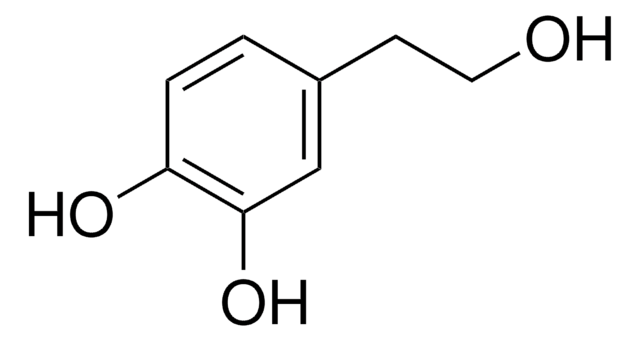37580
3,4-Dihydroxybenzoic acid
≥97.0% (T)
Synonym(s):
Protocatechuic acid
Sign Into View Organizational & Contract Pricing
All Photos(1)
About This Item
Linear Formula:
(HO)2C6H3CO2H
CAS Number:
Molecular Weight:
154.12
Beilstein:
1448841
EC Number:
MDL number:
UNSPSC Code:
12352100
PubChem Substance ID:
NACRES:
NA.22
Recommended Products
Assay
≥97.0% (T)
mp
197-200 °C (dec.) (lit.)
functional group
carboxylic acid
SMILES string
OC(=O)c1ccc(O)c(O)c1
InChI
1S/C7H6O4/c8-5-2-1-4(7(10)11)3-6(5)9/h1-3,8-9H,(H,10,11)
InChI key
YQUVCSBJEUQKSH-UHFFFAOYSA-N
Looking for similar products? Visit Product Comparison Guide
General description
3,4-Dihydroxybenzoic acid is reported as dietery polyphenol. Antiviral activity of 3,4-dihydroxybenzoic acid (protocatechuic acid, PCA) against a virulent H9N2 strain in a mouse model is reported. Cytotoxic effects of PCA on 3 non-small cell lung cancer (NSCLC) cell lines, A549, H3255, and Calu-6 cell lines is reported. PCA is reported to prevent the carcinogenesis or antitumor growth in vivo. Signaling pathway involved in PCA-induced apoptosis in human gastric adenocarcinoma (AGS) cells is reported. The oxidation of 3,4-dihydroxybenzoic acid by H2O2 in aqueous/goethite slurry at varying operating conditions (catalyst load, temperature, pH, substrate and hydrogen peroxide starting concentration) is investigated.
Application
3,4-Dihydroxybenzoic acid is suitable for use in a study to investigate the effect of 4-coumaric and 3,4-dihydroxybenzoic acid on the basal oxidative DNA damage of rat colonic mucosa in vivo. It may be used in the derivatization of chitosan resin.
Biochem/physiol Actions
Chemopreventive in several animal models of carcinogenesis. Blocks cell proliferation in the post-initiation phase.
Signal Word
Warning
Hazard Statements
Precautionary Statements
Hazard Classifications
Eye Irrit. 2 - Skin Irrit. 2 - STOT SE 3
Target Organs
Respiratory system
Storage Class Code
11 - Combustible Solids
WGK
WGK 1
Flash Point(F)
Not applicable
Flash Point(C)
Not applicable
Personal Protective Equipment
dust mask type N95 (US), Eyeshields, Gloves
Choose from one of the most recent versions:
Already Own This Product?
Find documentation for the products that you have recently purchased in the Document Library.
Customers Also Viewed
Hui-Hsuan Lin et al.
International journal of cancer, 120(11), 2306-2316 (2007-02-17)
3,4-Dihydroxybenzoic acid (protocatechuic acid, PCA) is discussed to represent antioxidative food components in a human diet rich in fruits and vegetables, and has been shown to prevent carcinogenesis or antitumor growth in vivo. However, the molecular mechanisms involved in chemopreventive
Akhmad Sabarudin et al.
Analytica chimica acta, 581(2), 214-220 (2007-03-28)
A chitosan resin derivatized with 3,4-dihydroxybenzoic acid moiety (CCTS-DHBA resin) was newly synthesized for the collection/concentration of trace uranium by using cross-linked chitosan (CCTS) as base material, and the adsorption behavior of uranium as well as 60 elements on the
Roberto Andreozzi et al.
Water research, 36(11), 2761-2768 (2002-07-31)
The oxidation by H2O2 of 3,4-dihydroxybenzoic acid (3,4-DHB) in aqueous/goethite slurry at varying operating conditions (catalyst load, temperature, pH, substrate and hydrogen peroxide starting concentration) is investigated. At adopted catalyst loads the observed kinetic developments are consistent with a non-radicalic
Shih-ming Tsao et al.
Nutrition and cancer, 66(8), 1331-1341 (2014-10-31)
Cytotoxic effects of protocatechuic acid (PCA) upon 3 nonsmall cell lung cancer (NSCLC) cell lines, A549, H3255, and Calu-6 cell lines, were examined. PCA at 1, 2, 4, and 8 μM was used to treat these cells. Results showed that
Francesco Guglielmi et al.
The British journal of nutrition, 89(5), 581-587 (2003-05-02)
The effect of 4-coumaric and 3,4-dihydroxybenzoic (protocatechuic) acid on the basal oxidative DNA damage of rat colonic mucosa in vivo was studied, relative to vitamin E. F344 rats were treated with 4-coumaric or protocatechuic acid mixed in the diet (25
Our team of scientists has experience in all areas of research including Life Science, Material Science, Chemical Synthesis, Chromatography, Analytical and many others.
Contact Technical Service









